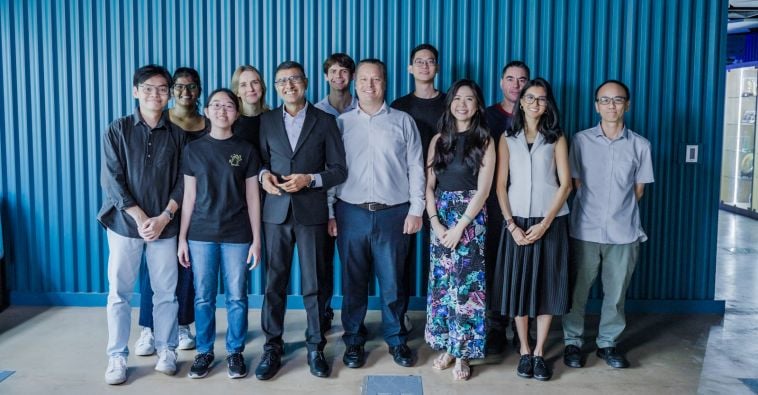Singapore Deep Tech Alliance charts new course for impact-driven innovation

The Aprisium team, a Series A portfolio venture of SDTA
In Singapore’s rapidly evolving deep tech landscape, one organisation is emerging as a key force in bridging science, capital and talent to drive global impact. Since its inception in 2020, the Singapore Deep Tech Alliance (SDTA) has positioned itself as a venture builder with a bold mission: fast-tracking the commercialisation of breakthrough technologies to address some of the world’s most pressing challenges.
SDTA has marked the past year with significant milestones. Among its most notable achievements is the launch of its non-profit division, designed to leverage philanthropic and catalytic capital for projects outside the traditional venture capital model.
According to co-founders Luuk Eliens and Clara Chen, this move aims to “bridge funding gaps for high-potential projects” while supporting underserved communities.
“Our focus is on creating tangible change at the grassroots level,” Chen explained. “By building community capacity to solve their own problems, we foster a sense of ownership and responsibility. These are the kinds of impacts that can be measured more immediately.”
One such example is the SG Eco Loop, an initiative equipping Institute of Technical Education (ITE) students with tools to tackle Singapore’s plastic waste problem.
Backed by the Ministry of Sustainability and the Environment (MSE) Eco Fund and Temasek Foundation’s Oscar Fund, students developed 25 proof-of-concept ideas in just a week. The top five teams have since received funding to prototype their solutions — including AI-powered sorting machines, smart bins and behavioural change campaigns.
Also Read: Small business, big impact: How AI is democratising entrepreneurship
“It was inspiring to see what the students created in such a short time,” Eliens shared. “Projects like these show that with the right resources, innovation can emerge from unexpected places.”
In parallel, SDTA has also strengthened its venture-building model by launching Deep Tech Venture Partners (DTVP), an investment arm providing capital from pre-seed to Series A stages for ventures emerging from its programmes. This move addresses a persistent challenge in the region — the reluctance of many investors to back deep tech ventures due to their perceived risks and long development cycles.
“Deep tech is one of the fastest growing categories in venture capital globally, but here in Southeast Asia, investor familiarity is still developing,” Eliens noted. “Part of our role is to reduce informational asymmetry, helping investors better understand these ventures and the opportunities they represent.”
The alliance’s commitment to refining its model is evident in recent structural changes. Drawing on data from past cohorts, SDTA now separates initial venture development from external founder recruitment, allowing for rigorous concept validation before integrating entrepreneurial talent.
According to Chen, this phased approach leads to “greater precision in founder integration at optimal inflexion points.”
Deep tech in Singapore today
Singapore’s deep tech sector has matured significantly in the last year, fuelled by growing interest in climate tech, artificial intelligence (AI) and advanced manufacturing. Government support and increasing investor appetite have further accelerated the commercialisation of research-driven innovations.
Also Read: 5 reasons why impact investing is becoming mainstream investing
SDTA sees itself as a critical player in this ecosystem, connecting top researchers with experienced entrepreneurs and providing the resources needed to transform science into scalable businesses.
Looking ahead, the alliance is particularly excited by the convergence of AI and climate tech.
“We’re seeing game-changing advancements, especially in vertical AI applications for industrial automation,” Eliens said. “Equally exciting are developments in sustainable materials and environmental technologies. Where these domains meet, there is incredible potential.”
However, fostering collaboration between startups, investors, and industry remains a complex endeavour.
Chen explained, “Even with structured agreements and open communication, dynamics like risk aversion and power imbalances make it hard to achieve true alignment. Success requires building a common language and shared vision — it’s a constant balancing act.”
This commitment to collaboration reflects SDTA’s broader vision for the future. Over the next phase of its growth, the alliance plans to scale its impact by expanding its ecosystem, deepening cross-border partnerships and refining its playbook for tech commercialisation.
“We’ve evolved from a single venture-building entity into an integrated group connecting science, talent and capital — venture, catalytic and philanthropic,” Eliens said. “Our aim is to tackle global challenges more effectively through systems thinking. Expanding this model into other markets is a natural next step.”
—
Image Credit: SDTA
The post Singapore Deep Tech Alliance charts new course for impact-driven innovation appeared first on e27.